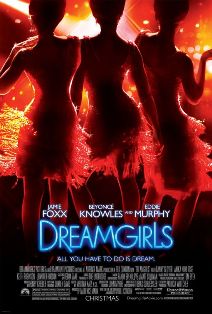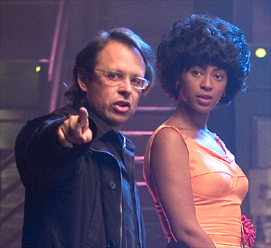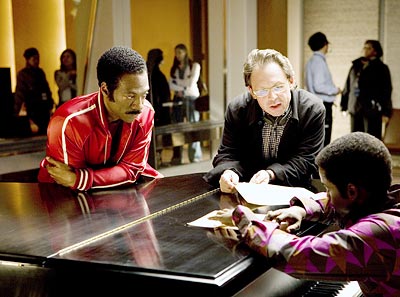 Bill Condon does not lack for humbleness. Though the Academy Award winning screenwriter of Gods and Monsters and the shoulda-been Academy Award nominated director of Dreamgirls must have considerable reserves of confidence stored away somewhere (how else does one manage the combustible egos of Jamie Foxx, Beyoncé Knowles and Eddie Murphy on the same movie), that brio certainly doesn’t surface in interviews – at least, not when discussing his craft. When discussing other films? Absolutely. This is my second time interviewing Condon, and what you’re getting below is roughly half the transcript. The other half is off-the-record cinephile talk – most of which I could share, but it’s really of the "What’ve you seen?"/"What’s good?"/"What DVDs have you bought lately?" variety. (My favorite part of the interview was Condon derailing my train-of-thought to excitedly inquire about Spider-Man 3.) Short version: Condon just purchased The Criterion Collection’s release of Stuart Cooper’s Overlord, he rather enjoyed Jake Kasdan’s The TV Set, and preferred one-half of Grindhouse over the other.
Bill Condon does not lack for humbleness. Though the Academy Award winning screenwriter of Gods and Monsters and the shoulda-been Academy Award nominated director of Dreamgirls must have considerable reserves of confidence stored away somewhere (how else does one manage the combustible egos of Jamie Foxx, Beyoncé Knowles and Eddie Murphy on the same movie), that brio certainly doesn’t surface in interviews – at least, not when discussing his craft. When discussing other films? Absolutely. This is my second time interviewing Condon, and what you’re getting below is roughly half the transcript. The other half is off-the-record cinephile talk – most of which I could share, but it’s really of the "What’ve you seen?"/"What’s good?"/"What DVDs have you bought lately?" variety. (My favorite part of the interview was Condon derailing my train-of-thought to excitedly inquire about Spider-Man 3.) Short version: Condon just purchased The Criterion Collection’s release of Stuart Cooper’s Overlord, he rather enjoyed Jake Kasdan’s The TV Set, and preferred one-half of Grindhouse over the other.
But when it comes to Dreamgirls, the theatrical version of which hits DVD May 1st (a longer, "ideal cut" is set for release this Christmas), Condon is all eloquent modesty. Though he’s very particular when describing how he arrived at the painful decision to cut one of his favorite songs from the film, and quite candid detailing what he doesn’t like about the test screening process, it never comes from a place of arrogance. And maybe that’s the key to understanding Condon; the confidence shines through in the work.
Q: Have you found yourself doing many interviews for the DVD release?
Condon: No, this is the only one.
Q: Really?
Condon: I think they’re bored sick of hearing from me about this movie. (Laughs)
Q: Maybe that’s just a function of the shortened window.
Condon: It could be. I haven’t thought about that. I did it for all the other movies, but not this.
Q: But this was also such a massively promoted film, not just because it was a big movie and a major theatrical release for Dreamworks, but also because of the Oscar component. The interesting thing about Dreamgirls is that those things were conflated: a lot of the fall releases, like The Departed, had the opportunity to be released as movies before the Oscar campaigns kicked into overdrive, whereas Dreamgirls came out, and it was like, "This is an Oscar movie and a mainstream entertainment." What’s it like to promote a movie with those kinds of expectations?
Condon: Right from the beginning, it was always, "What do you think about the Oscar?" And I always said the same thing, which was "If it happens, it’s a nice surprise. But you never expect it." And it turned out not to happen in a big way. It always felt to me a little… I wish people hadn’t been talking about it, frankly. I guess it’s part of opening at the end of December and being so close to that whole season. But I think you’re right. I think it does become too connected to everything else about the movie.
 Q: I really felt the film didn’t have a chance to be appreciated as a movie. Were you frustrated by that?
Q: I really felt the film didn’t have a chance to be appreciated as a movie. Were you frustrated by that?
Condon: It all happens so fast, and it becomes such a big job for several weeks, where you’re just promoting it and promoting it. The one thing that was a little frustrating was that right from the moment that we showed twenty minutes of the film at Cannes, people started talking it up. It was always regarded as this overhyped movie, but I don’t think it was the studio that was hyping it. It was just that people would see it and start talking about that stuff. It really wasn’t cultivated. But there you go.
Q: It does get out of your hands once the Oscar bloggers get a hold of it, because they’ve got to generate content for themselves.
Condon: Sure.
Q: They only have so many movies to work with. And, when you do the twenty-minute Cannes presentation… ever since The Lord of the Rings, that’s been a called shot insofar as Oscar is concerned.
Condon: That’s interesting, huh? You know, the whole point of the Cannes presentation was to sell Dreamgirls internationally; it was completely unknown overseas. And, indeed, it’s turned out to do only half as well overseas as it did in America because it is such an unknown property and because – at least in some countries – movies about the African-American experience don’t travel as well.
Q: Well, here you are now, devoid of the hype, and now you get a chance to see how it plays for viewers at home. I’m very interested to see the deleted scenes – in particular, the opening to "Steppin’ to the Bad Side". You cut out the slow burn intro to that number, and just jumped right into it. How did you decide to cut that down, and is there a part of you that maybe wishes you hadn’t?
Condon: It’s interesting, because it won’t be until the next DVD release at Christmas that the film will be totally reconstructed with a lot of those things put back in. Right now, we just have them as extras, number by number. But even in putting together that ideal cut, which maybe has eight or nine more minutes, I still didn’t include the beginning of "Steppin’ to the Bad Side". That was one of those things that turned out right to be shorter. But there’s a song that Effie and CeCe sing, called "Effie, Sing My Song", that I really do miss. I think we were right to thin out the music for the theatrical release, because you can’t just preach to the converted with a movie that costs this much. There are so many people, generations of people, who aren’t used to these conventions and get sort of worn down by that much music. I think it made sense in the original release, but it’s nice that we live in this world where you can have your own ideal version of the movie that exists as its own thing.
Q: What’s the running time for the ideal version?
Condon: I think it’s around 139 minutes.
Q: I’m going to assume you prefer the ideal version?
Condon: Good question. Obviously, I think it will take a little distance from it to figure it out. I still feel like I’m in the middle of it. There are things about each one that I like.
 Q: Getting back to the idea of paring these movie musicals down, there certainly is a tendency to avoid the bloat of those movies that killed the genre back in the 1960s and early 1970s. These new movie musicals really do feel conscious of their running times, but I do like a big, gaudy musical that isn’t afraid to breathe. How do you negotiate between serving the musical and keeping an eye on the demands of today’s marketplace?
Q: Getting back to the idea of paring these movie musicals down, there certainly is a tendency to avoid the bloat of those movies that killed the genre back in the 1960s and early 1970s. These new movie musicals really do feel conscious of their running times, but I do like a big, gaudy musical that isn’t afraid to breathe. How do you negotiate between serving the musical and keeping an eye on the demands of today’s marketplace?
Condon: The good and bad part of DVD is that you can have a couple of different versions of the movie. But that means that the theatrical version just becomes a version, even though that’s the one that most people will experience. It’s like any other movie, though; you don’t want it to be a punishing experience. (Laughs) But it’s so delicate. In "Effie, Sing My Song", which I cut, there’s a line Effie sings about Curtis: "It’s taken all these years to be free of loving that man." It’s a big bit of information that addresses what she’s done for these last few years [after being kicked out of the group]. You kind of get that in the theatrical release, but it’s nicer to hear her sing about it. It’s always tough. You’re not only losing a number, but a bit of character and a bit of story.
Q: Well, Jennifer certainly did okay without it. Still, you obviously love this moment. How did you decide it had to go?
Condon: That was really based on early screenings. It was just the feeling you’d get when it came to that point. There were several ballads in a row, and it was deep into the movie – almost two hours in, I think. You could just feel the audience sag in response to getting another song. There was also a longer version of "One Night Only", which is the song that follows "Effie, Sing My Song", and it just felt like we lost people. And it’s not about reading the [test screening] cards afterward; you can just feel things in the room. So I took it out, thinned out some of the music around it, and, the next time we screened the film, it played better.
Q: I’m glad that you bring up the idea of feeling the audience’s reaction in the room, because I’ve always hated the cards. You’re being asked to list five scenes you loved and five you disliked right after the movie, and it just feels too soon to order your reaction so rigidly. As you said, a really intuitive filmmaker can sit with the audience and sense their reaction; the cards are utterly useless.
Condon: I completely agree with you. I think that part of it is bogus. The audience discussion, all that stuff… I don’t think you need to spend all that money on it. You just need to get people who reflect an average audience – or whatever the audience is going to be for your movie; it may not be an average audience – together, and play it for them. You’ll learn more from that than any of the other stuff.
Q: At that point, you’re treating the film like a mathematical equation.
Condon: I agree.
Q: With the success of Dreamgirls and a few other movie musicals, it looks like the genre is back and thriving. We have Hairspray coming out this summer, but I was shocked when I read that Rob Marshall was set to make Maury Yeston’s Nine. I know it did very well during its Broadway revival, but it’s based on Fellini’s 8½. Is it surprising that we’re getting to these more esoteric musicals?
Condon: It’s incredibly exciting that Sweeney Todd is getting made. That’s basically an opera. But people are being given one of the most distinguished musicals of the last thirty years with, it seems, the perfect director. That’s exciting. And Nine… even though it’s not as well known as the others, I think Rob has thought about it so carefully, and understands better than anybody that it’s hard to find a musical that should be a movie. And Nine totally makes sense because it’s about a filmmaker’s imagination, which will give you great freedom; it will allow you to go to places that more realistic musicals struggle with.
Q: But even Dreamgirls was a challenging sell to the American public; I think Nine is an amazing risk. And while Sweeney Todd will have elements that will be easy to promote, it is Sondheim, and he’s never been an easy sell.
Condon: Hopefully, you temper that with Depp. (Laughs)
Q: I guess that’s how you do it. For now, people seem primed to follow him into anything.
Condon: I love the fact that he uses his moment of popularity to do things like this, and bring people to places they ordinarily wouldn’t go.
Q: Since we’re finally getting to stuff like Dreamgirls and Sweeney Todd, both of which flirted with film for decades, are there any other musicals you’re dying to see or make yourself?
Condon: There are a few. I hope Follies gets made. You hear some rumors that it might get made. For a moment, I was dancing with it, but I had a take on it that the bookwriter’s widow disagreed with. I hope someone does Follies, because that’s a great show that could be reinvented for the screen.
Q: Having done Dreamgirls, do you feel now that you need to back away from musicals?
Condon: I don’t think I need to, but I think it is nice to mix it up. There’s no question, though, that I want to take the genre on again at some point. It’s so hard to figure out your next movie after you’ve done something like Dreamgirls. It’s so fun, you know? It challenges all these facets of your creativity.
 Q: It’s interesting to hear you say that making Dreamgirls was fun. You look at all of those stars, and you see huge egos and potential for conflict. You just immediately figure it must’ve been a hellish experience.
Q: It’s interesting to hear you say that making Dreamgirls was fun. You look at all of those stars, and you see huge egos and potential for conflict. You just immediately figure it must’ve been a hellish experience.
Condon: No, it was a great time. First of all, I think everyone’s always a little nervous of musicals because they’re stretching into areas they haven’t gone into before. But everyone was so into getting it right. They knew Dreamgirls meant something to people, and they wanted it to live up to everyone’s memory of it. Also, I think people do have more fun when, every second day, they’re getting up and performing.
Q: And this was especially true of Eddie, though he was a little shy at first, right?
Condon: He’s a bit shy naturally. But he was doing something he’d never done, so, before every number, there’d be a little bit of "Oh, god, let’s just do a little bit of it." But then he’d get started and take off, and it would be amazing to watch.
Q: With an audience in the room, which immediately validated his work. And he was a little surprised by that, right?
Condon: Right. I remember he did "Jimmy’s Rap" for the first time with this huge audience watching, and everybody just cheered. He looked so stunned that everyone liked it that much. Shooting those numbers was sort of like shooting a documentary, because, even though they were extras, they just turned into an audience. They had their own reaction to things, but there was an incredible electricity whenever Eddie performed. You could tell that there was a lot of goodwill built up over the years.
Q: Goodwill from the audience, but not so much from the critics. I think for some of us who grew up watching Eddie, and he is unquestionably the biggest comedy star of my lifetime… to get him in a movie like this, where he did things I hadn’t seen him do, it validated what a lot of us had been saying over the years, which is that he is a phenomenally gifted actor. But while there was some initial critical acceptance, and he did win numerous awards, there was this harsh backlash. It was really without provocation. He’d made this comeback, he seemed to have turned a corner, and then the knives came out. Did that take you by surprise?
Condon: Totally. I don’t understand it now, either. You watch those things happen, and it’s so stunning. I remember, right after the movie opened, there was this article in The New York Times, and half of it was John Landis or somebody else talking about how difficult he was. For me, I hadn’t found him difficult ever; he was a total pleasure to work with. But it was interesting to see that come about. That article was referring to feuds I didn’t even know about. It was surprising, though, that this became an element of people’s coverage of the movie.
Q: Getting back to the topic of what you might do next, we’ve discussed our admiration for Hitchcock and De Palma. I’m wondering if you’ve had any inclination to return to your genre roots.
Condon: I have. I don’t know if it’s going to happen, but I was actually looking at a French thriller that has some interesting stuff going on in it. It might be worth doing a different version, but it’s incredibly early [in that process]. But the idea of Hitchcockian movie would be amazing.
Q: I love the contrast of you going from Dreamgirls to something with a bit of a mean streak to it.
Condon: Me, too! (Laughs)
Q: Are you worried how audiences might react to that?
Condon: I don’t think anyone’s watching, frankly. (Laughs) None of these movies seem to connect, so I definitely don’t think that way. When I look at people who are having interesting careers, they sort of pursue their own interests. And where that takes them, sometimes they drop off and come back.
Dreamgirls is available on DVD May 1st.